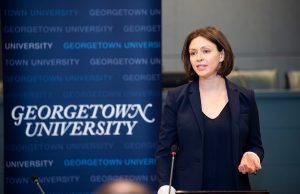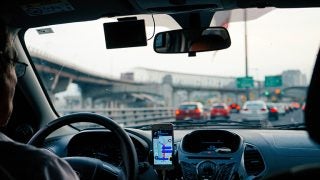
More than half of the drivers surveyed felt unsafe on the job, with 41% experiencing assaults or harassment, researcher Katie Wells found. Nearly half reported underpayment or no payment for jobs, and all drivers weren’t paid for the time they spent waiting on the job – which accounted for half of their work time.
“While the industry provides convenient access to food for consumers, the workers powering the industry struggle to make ends meet,” Wells writes in the report. “We recommend enacting legislation to ensure fair and just working conditions in the instant food delivery industry.”
Wells, a Postdoctoral Fritz Fellow with Georgetown’s Tech & Society Initiative, presented her findings and policy recommendations alongside the report’s co-author, sophomore Isabella Stratta (SFS’25), at Georgetown’s School of Continuing Studies on April 19. DC Councilmember Charles Allen, chair of the council’s Committee on Transportation and the Environment, gave opening remarks.
“We don’t collect knowledge for the sake of collecting it,” Wells says. “We collect it so we can live better lives, and we can shape the city in a better way.”
Finding Drivers
Over the course of 18 months, Wells, Stratta and student researchers interviewed 41 drivers who worked for food delivery companies such as DoorDash, GrubHub, UberEats and Instacart. They recruited drivers outside restaurants with high-volume deliveries in Washington, DC, inviting them to participate outside of work hours so as not to affect their delivery ratings, Wells said. The majority of drivers represented racial and ethnic minorities, and more than half had at least one college degree.
Wells had conducted similar research in 2019 on ride-share drivers in DC. Four years later, as the instant food delivery market mushroomed in sales and size during the COVID-19 pandemic, she found many of the drivers she interviewed had moved to food delivery. She also found that drivers faced safety risks, unpaid work and pay variation, and data collection concerns.
Safety Threats

In the report, 51% of drivers surveyed said they had felt unsafe or feared for their physical well-being on the job. Many of these drivers did not report an incident to their companies, believing their company would not help or that they would be penalized for disrupted or incomplete orders.
Many respondents faced verbal harassment, physical assault, carjackings, parking tickets and restricted bathroom access. Many workers also worried they would be penalized if they took a break to find a bathroom outside of a designated delivery route.
Twenty-three percent of workers experienced vehicle collisions or accidents, and 15% did not have health insurance, reflective of an industry in which U.S. instant food delivery drivers are classified as self-employed and most do not receive health insurance or qualify for paid sick leave, the report detailed.
“DC isn’t an exception,” Wells said. “What we found aligns completely with what we see in other domestic or international studies around safety, violence and accidents.”
‘Black Hole’ of Payment Systems, Unpaid Work
The report also found that drivers experienced a lack of pay transparency, or as one driver referred to it, a ‘mysterious black hole’ of a payment system.
Two drivers would receive different payments for nearly identical delivery trips at the same hour, at the same restaurant, Wells found. In total, 49% of workers received underpayment or no payment for delivery for at least one delivery. As drivers are responsible for job-related expenses such as gas, insurance, car maintenance and taxes, many find it difficult to earn a living wage, she said.
“A lot of the narratives on the gig economy is that it’s a temporary workplace. It’s work that allows you to make an extra buck,” Stratta, the report’s co-author, said. “But what was surprising is that it’s not temporary. When you realize this is a full-time job for a lot of people [without access to benefits], that becomes a real problem.”
The report also details how drivers were not paid for the time they spent waiting for orders on their phones, for meals to be prepared, or for customers to pick up the order.
Policy Recommendations
In the report, Wells outlines policy interventions for DC legislators, including access to bathrooms at restaurants, pay transparency, employment and data rights, and an established minimum trip payment for instant food delivery drivers — the latter of which is in line with protections in New York City and Seattle, Washington, she says. Wells also hopes the report promotes solidarity and a labor movement among workers who work in an isolated field.
“A full decade after its arrival in D.C., regulators have not mandated that the instant food delivery industry uphold basic worker rights,” she wrote. “In the absence of federal responses to the labor conditions in the instant delivery workplace, local and state-level regulators play a crucial role.”
Wells is publishing her research on Uber and local governance in DC in her book, Disrupting D.C.: The Rise of Uber and the Fall of the City, published by Princeton University Press this fall.
A Student’s Inside Track to Research

In November 2022, Stratta, a sophomore in the School of Foreign Service, joined Wells and another research assistant to testify before DC’s Council for the Fair Meals Delivery Act of 2022, which enacted new legislation on restaurant and food delivery service platform interactions. She had spent the previous summer interviewing drivers and that fall looking for patterns in the interviews.
For Stratta, working on the report gave her a front-row seat to the full process of research, from conducting interviews, to analysis, to advocacy.
“I got to see the whole process of qualitative research, which was really exciting,” Stratta said. “Through the research and Katie’s amazing mentorship, I got to learn about the challenges of this workforce and get their voices heard. Katie’s given me a great view of researchers because she tries to get her research into the public, and that’s inspiring to me.”


